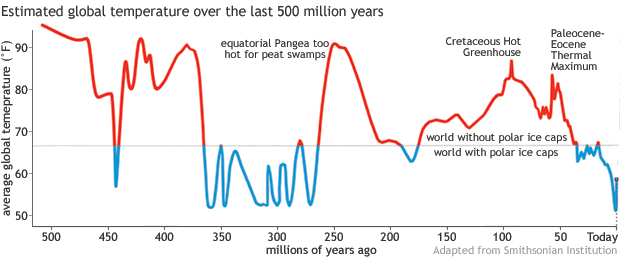D
Deleted member 16246
Guest
One of the reasons I bought an e-bike conversion was that I wanted to test the practicality of electric powered transport without throwing 30 thousand of more at a barely practical car. I am enjoying it, but I am interested in the wider question of the necessity of all the UK's wider plan to 'decarbonise' our country. I don't deny that CO2 release causes warming - it is a fact, but I do question the idea that 'the world will end' if we carry on doing what we have been doing for a couple of hundred years. The long term trend of global mean temperature rise shows a rise of slightly less than one degree centigrade over more than a century. The rate of rise has picked up a bit since China became a mega emitter, but what is the long term record of the planet's temperature?
I went to NOAA the American climate body as an authoritative source and found this graph showing estimated global mean temperature over the last five hundred million years. It gives the lie to the idea that a few degrees will end the world.

Our present situation is at the right hand end of this graph. For most of the last half billion years, Earth was much hotter than it is now. The boundary between the red and blue lines is red = no polar ice caps, blue = polar ice caps present.
The page I found this graph on, is an interesting one and you can find a lot of information here:

 www.climate.gov
www.climate.gov
I think our government is leading us into an economic and living standards disaster with laws forbidding installation of oil and gas boilers, and bans on the sale of new fossil fuel powered vehicles. The UK emits slightly less than 1% of global carbon dioxide. All we will do is ruin our living standards, while China,the USA and the other mega emitters carry on as usual.
Quote from NOAA page referenced above:
I went to NOAA the American climate body as an authoritative source and found this graph showing estimated global mean temperature over the last five hundred million years. It gives the lie to the idea that a few degrees will end the world.

Our present situation is at the right hand end of this graph. For most of the last half billion years, Earth was much hotter than it is now. The boundary between the red and blue lines is red = no polar ice caps, blue = polar ice caps present.
The page I found this graph on, is an interesting one and you can find a lot of information here:

What’s the hottest Earth’s ever been?
Earth’s hottest periods occurred before humans existed. Those ancient climates would have been like nothing our species has ever seen.
I think our government is leading us into an economic and living standards disaster with laws forbidding installation of oil and gas boilers, and bans on the sale of new fossil fuel powered vehicles. The UK emits slightly less than 1% of global carbon dioxide. All we will do is ruin our living standards, while China,the USA and the other mega emitters carry on as usual.
Quote from NOAA page referenced above:
Modern human civilization, with its permanent agriculture and settlements, has developed over just the past 10,000 years or so. The period has generally been one of low temperatures and relative global (if not regional) climate stability. Compared to most of Earth’s history, today is unusually cold; we now live in what geologists call an interglacial—a period between glaciations of an ice age. But as greenhouse-gas emissions warm Earth’s climate, it's possible our planet has seen its last glaciation for a long time.
Last edited:










